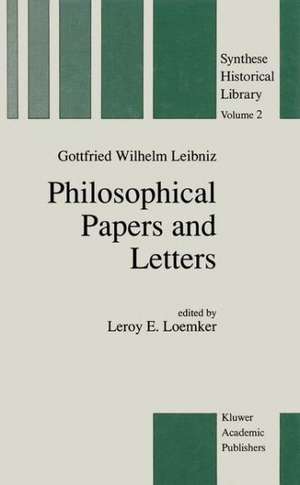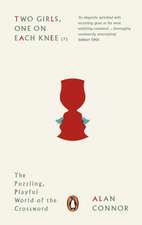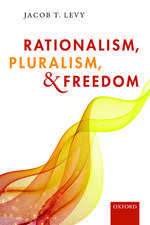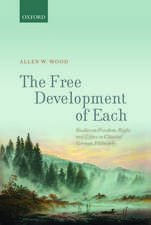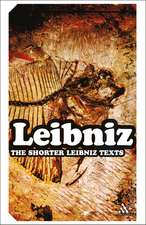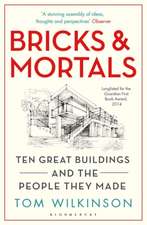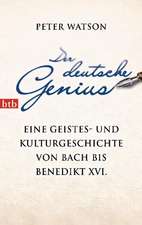Philosophical Papers and Letters: A Selection: Synthese Historical Library, cartea 2
Autor G.W. Leibniz Traducere de L.E. Loemkeren Limba Engleză Paperback – 31 dec 1975
| Toate formatele și edițiile | Preț | Express |
|---|---|---|
| Paperback (1) | 2321.96 lei 6-8 săpt. | |
| SPRINGER NETHERLANDS – 31 dec 1975 | 2321.96 lei 6-8 săpt. | |
| Hardback (1) | 2328.44 lei 6-8 săpt. | |
| SPRINGER NETHERLANDS – 31 dec 1975 | 2328.44 lei 6-8 săpt. |
Din seria Synthese Historical Library
-
 Preț: 377.18 lei
Preț: 377.18 lei -
 Preț: 402.56 lei
Preț: 402.56 lei -
 Preț: 386.22 lei
Preț: 386.22 lei - 18%
 Preț: 1224.85 lei
Preț: 1224.85 lei -
 Preț: 394.29 lei
Preț: 394.29 lei -
 Preț: 382.36 lei
Preț: 382.36 lei - 18%
 Preț: 2092.94 lei
Preț: 2092.94 lei - 15%
 Preț: 640.37 lei
Preț: 640.37 lei - 18%
 Preț: 1329.93 lei
Preț: 1329.93 lei - 18%
 Preț: 948.29 lei
Preț: 948.29 lei - 15%
 Preț: 643.48 lei
Preț: 643.48 lei - 18%
 Preț: 952.40 lei
Preț: 952.40 lei - 15%
 Preț: 639.90 lei
Preț: 639.90 lei -
 Preț: 387.75 lei
Preț: 387.75 lei - 18%
 Preț: 949.73 lei
Preț: 949.73 lei - 18%
 Preț: 1220.54 lei
Preț: 1220.54 lei - 18%
 Preț: 951.47 lei
Preț: 951.47 lei - 15%
 Preț: 643.34 lei
Preț: 643.34 lei - 18%
 Preț: 955.70 lei
Preț: 955.70 lei - 18%
 Preț: 1544.63 lei
Preț: 1544.63 lei - 18%
 Preț: 951.29 lei
Preț: 951.29 lei -
 Preț: 391.99 lei
Preț: 391.99 lei - 18%
 Preț: 1385.85 lei
Preț: 1385.85 lei - 24%
 Preț: 1050.97 lei
Preț: 1050.97 lei - 18%
 Preț: 1827.63 lei
Preț: 1827.63 lei - 18%
 Preț: 1552.83 lei
Preț: 1552.83 lei - 18%
 Preț: 1220.88 lei
Preț: 1220.88 lei - 18%
 Preț: 949.73 lei
Preț: 949.73 lei
Preț: 2321.96 lei
Preț vechi: 2831.66 lei
-18% Nou
Puncte Express: 3483
Preț estimativ în valută:
444.30€ • 465.13$ • 367.63£
444.30€ • 465.13$ • 367.63£
Carte tipărită la comandă
Livrare economică 05-19 aprilie
Preluare comenzi: 021 569.72.76
Specificații
ISBN-13: 9789027706935
ISBN-10: 902770693X
Pagini: 752
Ilustrații: XII, 736 p.
Dimensiuni: 155 x 235 x 39 mm
Greutate: 1.03 kg
Ediția:2nd ed. 1989
Editura: SPRINGER NETHERLANDS
Colecția Springer
Seria Synthese Historical Library
Locul publicării:Dordrecht, Netherlands
ISBN-10: 902770693X
Pagini: 752
Ilustrații: XII, 736 p.
Dimensiuni: 155 x 235 x 39 mm
Greutate: 1.03 kg
Ediția:2nd ed. 1989
Editura: SPRINGER NETHERLANDS
Colecția Springer
Seria Synthese Historical Library
Locul publicării:Dordrecht, Netherlands
Public țintă
ResearchCuprins
Introduction: Leibniz as Philosopher.- I. The 17th Century.- II. Leibniz’s Life and Work.- III. The Metaphysical Pattern.- IV. Leibniz’s Method 19 V. Logic and the Principles of Truth and Reality.- VI. Mathematics and Philosophy.- VII. Physics and the Realm of Nature.- VIII. Biology.- IX. Psychology.- X. Theory of Knowledge.- XI. Summary: Structure and Purpose.- XII. Ethics and Social Thought.- XIII. Theology.- XIV. Leibniz’s Consistency and Influence.- I. Mainz and Paris, 1666–76.- 1. Dissertation on the Art of Combinations, 1666 (Selections).- I. Demonstration of the Existence of God.- II. Corollaries for Disputation.- III. Cum Deo!.- Definitions.- Problems.- 2. A New Method for Learning and Teaching Jurisprudence, 1667 (Selections from Part I).- I. General and Common to All Faculties: on a Basis for Studies in General.- 3. Letter to Jacob Thomasius, 1669.- 4. Letter to Thomas Hobbes, 1670.- 5. Theological Writings Related to the Catholic Demonstrations, 1668–70.- I. The Confession of Nature against Atheists, 1669.- II. A Fragment on Dreams.- III. On Transubstantiation, 1668(?).- Supplement: Notes on the Eucharist, 1668.- 6. Preface to an Edition of Nizolius, 1670 (Selections).- 7. Elements of Natural Law, 1670–71.- 8. Studies in Physics and the Nature of Body, 1671.- I. The Theory of Abstract Motion: Fundamental Principles.- II. An Example of Demonstrations about the Nature of Corporeal Things Drawn from Phenomena.- 9. Letter to Magnus Wedderkopf, 1671.- 10. Letter to Antoine Arnauld, 1671 (Selection).- 11. Letter to Simon Foucher, with Notes on Fouche?s Reply to Des Gabets, 1675.- 12. Selections from the Paris Notes, 1676.- 13. Letter to Henry Oldenburg, 1675.- 14. Two Notations for Discussion with Spinoza, 1676.- II. Hanover to the Italian Journey,1676–87.- 15. On a Method of Arriving at a True Analysis of Bodies and the Causes of Natural Things, 1677.- 16. Letter to Arnold Eckhard, 1677.- 17. Dialogue, 1677.- 18. Letter to Herman Conring, 1678.- 19. Letter to Walter von Tschirnhaus, 1678.- 20. On the Ethics of Benedict de Spinoza, 1678.- I. On God.- 21. What is an Idea? 1678.- 22. Letters to Nicolas Malebranche, 1679 (Selections).- 23. Two Dialogues on Religion, ca. 1678 (Selections).- I. Dialogue between Poliander and Theophile.- II. Dialogue between Polidore and Theophile.- 24. On the General Characteristic, ca. 1679.- 25. On Universal Synthesis and Analysis, or the Art of Disco very and Judgment, 1679(?).- 26. Two Studies in the Logical Calculus, 1679.- I. Elements of Calculus.- II. Specimen of Universal Calculus.- 27. Studies in a Geometry of Situation, 1679.- I. Letter to Christian Huygens, 1679.- II. Supplement.- III. On Analysis Situs.- 28. Letter to John Frederick, Duke of Brunswick-Hanover, 1679.- 29. On Freedom, ca. 1679.- 30. “First Truths”, ca. 1680–84.- 31. Selections from Leibniz’s Correspondence, 1679–84.- I. To Christian Philipp, 1679.- II. To Philipp, 1680.- III. To François de la Chaise, 1680.- IV. To Veit Ludwig von Seckendorf, 1683.- V. To Walter von Tschirnhaus, 1684.- 32. On the Elements of Natural Science, ca. 1682–84.- I. The Plan of the Book277 II. An Introduction on the Value and Method of Natural Science.- 33. Meditations on Knowledge, Truth, and Ideas, 1684.- 34. A Brief Demonstration of a Notable Error of Descartes and Others Concerning a Natural Law, 1686.- 35. “Discourse on Metaphysics”, 1686.- 36. Correspondence with Arnauld, 1686–87 (Selections).- 37. Letter of Mr. Leibniz on a General Principle Useful in Explaining the Laws of Nature through a Considerationof the Divine Wisdom; to Serve as a Reply to the Response of the Rev. Father Malebranche, 1687.- to Parts III and IV.- III. Hanover to the Death of Ernest August, 1690–98.- 38. Letter to Arnauld, 1690.- 39. On the Method of Distinguishing Real from Imaginary Phenomena.- 40. On the True Theologia Mystica, ca. 1690(?).- 41. A Study in the Logical Calculus.- 42. Critical Thoughts on the General Part of the Principles of Descartes, 1692.- On Part I.- On Part II.- 43. Correspondence with Huygens, 1692–94 (Selections).- 44. From the Ethical and Legal Writings, 1693–1700.- I. From the Preface of the ‘Codex Juris Gentium Diplomaticus’.- II. From the Preface to the Mantissa Codicis Juris Gentium.- III. On Wisdom.- IV. On Natural Law 428 A Classification of Societies or Communities.- 45. On the Correction of Metaphysics and the Concept of Substance, 1694.- 46. Specimen Dynamicum, 1695.- 47. I. A New System of the Nature and the Communication of Substances, as well as the Union between the Soul and the Body, 1695.- II. “Second Explanation of the New System”, 1696.- 48. Letter to Gabriel Wagner on the Value of Logic, 1696.- 49. Letters to Des Billettes, 1696–97.- 50. Tentamen Anagogicum: An Anagogical Essay in the Investigation of Causes, ca. 1696.- 51. On the Radical Origination of Things, 1697.- 52. Clarification of the Difficulties which Mr. Bayle has found in the New System of the Union of Soul and Body, 1698.- 53. On Nature Itself, or on the Inherent Force and Actions of Created Things, 1698.- IV. Hanover under George Louis, 1698–1716.- 54. Correspondence with John Bernoulli, 1698–99.- 55. Correspondence with De Voider, 1699–1706.- 56. Letter to Varignon, with a Note on the ‘Justification of the Infinitesimal Calculus by That of Ordinary Algebra’,1702.- I. Letter to Varignon, February 2, 1702.- II. Justification of the Infinitesimal Calculus by That of Ordinary Algebra, 1701.- 57. On What is Independent of Sense and of Matter, 1702.- 58. Reflections on the Doctrine of a Single Universal Spirit, 1702.- 59. Reflections on the Common Concept of Justice, 1702(?).- 60. Reply to the Thoughts on the System of Pre-Established Harmony contained in the Second Edition of Mr. Bayle’s Critical Dictionary, Article Rorarius 1702.- 61. Considerations on Vital Principles and Plastic Natures, by the Author of the System of Pre-Established Harmony, 1705.- 62. Letter to Hansch on the Platonic Philosophy or on Platonic Enthusiasm, 1707.- 63. Correspondence with Des Bosses, 1709–15.- 64. Conversation of Philarète and Ariste, following a Conversation of Ariste and Theodore, ca. 1711.- 65. Remarks on the three Volumes Entitled Characteristics of Men, Manners, Opinions, Times,... 1711, 1712.- 66. The Principles of Nature and of Grace, based on Reason, 1714.- 67. “The Monadology”, 1714.- 68. Letters to Nicolas Remond, 1714–15.- 69. Letters to Louis Bourguet, 1714–15.- 70. The Metaphysical Foundations of Mathematics, after 1714.- 71. The Controversy between Leibniz and Clarke, 1715–16.
